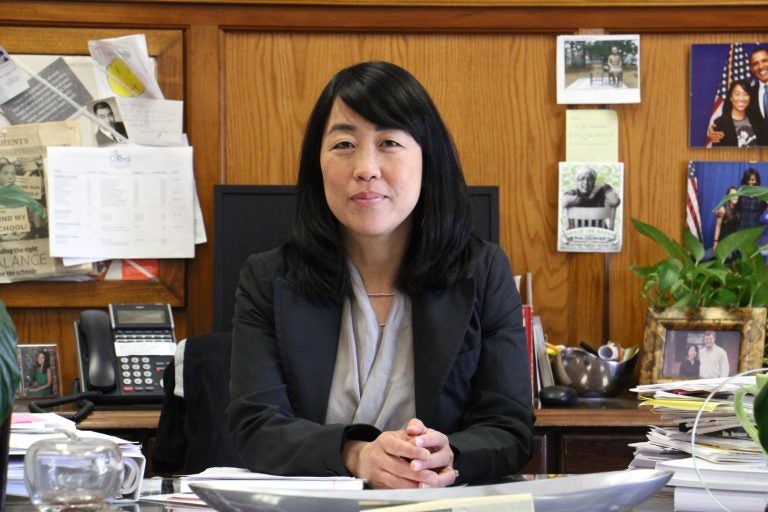Philadelphia could become the next city to pass a scheduling law for retail and fast-food companies
Across the country, retail and fast-food employees have said that unpredictable work schedules, the kind churned out by computer programs, wreak havoc on their lives.

City Councilwoman Helen Gym (Emma Lee/WHYY)
Across the country, retail and fast-food employees have said that unpredictable work schedules, the kind churned out by computer programs, wreak havoc on their lives.
They don’t know how many hours they’re going to get each week, so they don’t know how much money they’re going to make. Inconsistent hours make it impossible to plan for child care or classes or other part-time jobs. And often, they want to work more hours but can’t get them.
Advocates have branded the issue as the fight for a “fair workweek,” and such cities as San Francisco, Seattle, and New York have all passed laws to tackle these issues. Now, lawmakers in Philadelphia, where the retail and hospitality industry is responsible for nearly one-fifth of jobs, have made the first step to do the same.
Councilwoman Helen Gym, along with three other Council members, is scheduled to introduce a bill Thursday that requires fast-food and retail employers to:
- Give at least two weeks’ notice of schedules.
- Offer hours to existing employees when they become available instead of hiring new employees at a lower rate.
- Pay employees when shifts are canceled.
The bill, which is similar to what other cities and states have passed, is another example of Philadelphia city government developing protections for local workers in the form of regulations on businesses. City Hall has seen mixed success: Council passed in 2015 a mandatory paid sick-leave bill and in 2014 a requirement that city contractors pay workers $12 an hour. In another example, the Greater Philadelphia Chamber of Commerce filed a lawsuit over Council’s 2016 “wage equity” law that bars employers from asking about salary history, and its enforcement is still uncertain.
The Chamber declined to comment until it saw the workweek bill’s details, but in an open letter to City Council sent last week, it said it opposed “pending legislation that proposes to impose predictable scheduling formulas onto unpredictable business environments.”
At a City Council hearing in March on the issue, Chamber CEO Rob Wonderling decried what he said was “a very interesting pattern emerging in the city of Philadelphia” in which Council was making city government act as a human resources department for local companies. He urged Council to consider how it would impact small companies — 85 percent of the chamber’s members have fewer than 100 employees — and not just the big-box retailers.
Representatives from retail and food service associations, such as David French, senior vice president for government relations of the National Retail Federation, say laws like this don’t reflect the fact that people choose these industries because of their flexibility.
That doesn’t square with the experience of Tori Price, who used to work at the Target at 12th and Chestnut to help support her mother and siblings. “There’s no way to support a family of seven or do any financial planning when my hours range constantly from 20 to 35 hours per week,” the 19-year-old West Philadelphian said in written testimony at the March hearing. She was called in to work that day so couldn’t attend the hearing in person. “We have an eviction notice on our house, but I don’t even know what rent I can afford, so how can I look for a new apartment?”
Melissa Bova, vice president of government affairs for the Pennsylvania Restaurant and Lodging Association, said that a scheduling law would hurt a company’s bottom line.
Gym said the law would be good for business, too, pointing to research that showed that more consistent scheduling led to higher productivity and sales.
That other cities have passed similar laws helps, she added, because national chains have had to adjust.
“They’re already doing this work in New York City and Seattle,” Gym said. “There’s no reason they can’t do it here in Philadelphia.”
City Council is set to break for the summer in a few weeks. Gym spokeswoman Melissa McCleery said the councilwoman was introducing the bill now so it could be a top priority when Council reconvenes.
—
 WHYY is one of 19 news organizations producing Broke in Philly, a collaborative reporting project on solutions to poverty and the city’s push towards economic justice. Follow us at @BrokeInPhilly
WHYY is one of 19 news organizations producing Broke in Philly, a collaborative reporting project on solutions to poverty and the city’s push towards economic justice. Follow us at @BrokeInPhilly
WHYY is your source for fact-based, in-depth journalism and information. As a nonprofit organization, we rely on financial support from readers like you. Please give today.




